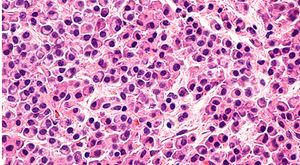
Further evidence strengthens the support of mirvetuximab soravtansine as a new standard of care for folate receptor-alpha—positive ovarian cancer resistant to platinum chemotherapy.

Further evidence strengthens the support of mirvetuximab soravtansine as a new standard of care for folate receptor-alpha—positive ovarian cancer resistant to platinum chemotherapy.

The antifungal prophylaxis azoles did not impact the safety and efficacy of ruxolitinib in patients with graft-vs-host disease.

Talazoparib reduced the risk of progression or death by 55% in patients with metastatic castration-resistant prostate cancer and homologous recombination repair gene alterations.

Dostarlimab met its primary end point in the phase 3 RUBY trial by increasing the 2-year progression-free survival rate to 36.1%, compared with 18.1% with placebo.

Patients with hepatocellular carcinoma achieved a median overall survival of 15.9 months with tislelizumab and 14.1 months with sorafenib.

The rate of event-free survival associated with pembrolizumab was significantly higher among patients with high-risk melanoma about to undergo surgery than among those who received immunotherapy following surgery.

Treatment modifications were inconsistent among White and Black patients with breast cancer. However, the use of a multiscale biophysical modeling platform may be useful in informing treatment modification decisions.

A study of 2 cohorts shows that the combination of regorafenib and pembrolizumab is effective in generating anti-tumor activity in patients with HCC.

Gastrointestinal (GI) adverse events (AEs) that occurred in patients with metastatic breast cancer who were treated with oral paclitaxel and encequidar can be managed by the use of 5- HT3 inhibitors and early intervention with loperamide, according to research presented at the 2020 San Antonio Breast Cancer Symposium.

As COVID-19 cases continued to increase across the United States at the onset of the pandemic, many elective treatments and routine visits to hospitals and clinics were canceled or moved online.

Brad S. Kahl, MD, discusses the unique challenges that occur when treating patients with indolent non-Hodgkin lymphoma.

People who quit smoking at any time, even up to 2 years before a lung cancer diagnosis, have increased chances of survival after their diagnosis, according to data during a 2020 ASCO Virtual Scientific Program press briefing.

As the number of elderly oncology patients rises rapidly, nurses need training to properly assess their needs.

There's a title wave of older adults flooding the healthcare system. Hear from two oncology nurses on how practitioners can be preapred to give high-quality care.

Recent findings showed patients with advanced melanoma had a favorable complete response to nivolumab and ipilimumab due to potential biomarkers in the disease.

New findings show that while nurses need to provide more palliative care to patients, they are not prepared to do so, leading to high levels of moral distress.

Canada’s first immunotherapy oncology program provides patient education to not only help them understand the therapy but also mitigate immune-related adverse events.

In this month’s episode of the "CURE Talks Cancer Podcast: Nursing Edition," we had the chance to talk with Betty Ferrell, FAACN, FCPN, MA, PhD, director of the Division of Nursing Research and Education at City of Hope, and discuss the important differences between palliative care and end of life care.

Patients with cancer undergoing stem cell transplant are experiencing depression at higher rates than other cancer survivors, and special interventions are required to address their psychosocial needs.

The Food and Drug Administration granted accelerated approval to zanubrutinib for the treatment of relapsed and refractory mantle cell lymphoma.

Lung cancer treatments are advancing. With these changes come new complications and questions that nurses will have to address with their patients.

Frahad Ravandi-Kashani, MD, had the chance to discuss the role of MRD in treating patients with hairy cell leukemia.

Following concerns over breast implant-associated cancer and illnesses, the Food and Drug Administration issued draft guidelines for additional labeling measures on devices.

At the 2019 ESMO Congress, the phase II KATE2 trial missed its primary endpoint but found promising results for a subgroup of patients with HER2-positive breast cancer with a PD-L1 expression.

Immunotherapy is sometimes considered solely for the later stages of treatment, but findings from a new study show promise for immunotherapy in treating patients with early breast cancer.

By implementing a survivorship program at their cancer center, oncology nurses were able to improve the quality of life in patients with recurrent breast cancer.

The FDA has granted a priority review for Trastuzumab Deruxtecan to treat HER2-positive metastatic breast cancer based on the results from two new studies.

At the 2019 ESMO Congress, results for the MONALEESA-3 trial showed promise for patients with breast cancer and had many experts excited over its clinical implications.

In this month’s episode of CURE Talks Cancer Podcast: Nursing Edition, we had the chance to speak with Chasity M. Washington, MPH, CHES, on how the diversity in the workplace is important to cancer care.

Management of axillary lymph nodes in patients with breast cancer has undergone some positive changes, but more research is required to treat this patient population properly.

Published: June 28th 2021 | Updated:

Published: September 18th 2022 | Updated:

Published: April 1st 2023 | Updated:

Published: September 22nd 2022 | Updated:

Published: August 19th 2019 | Updated:

Published: September 7th 2019 | Updated: